2023年外研版中考英语一轮复习 第十九节 九年级下册 Module 1 ~ Module 4课件(共76张PPT)
文档属性
| 名称 | 2023年外研版中考英语一轮复习 第十九节 九年级下册 Module 1 ~ Module 4课件(共76张PPT) |  | |
| 格式 | pptx | ||
| 文件大小 | 642.9KB | ||
| 资源类型 | 教案 | ||
| 版本资源 | 外研版 | ||
| 科目 | 英语 | ||
| 更新时间 | 2023-06-08 08:23:08 | ||
图片预览

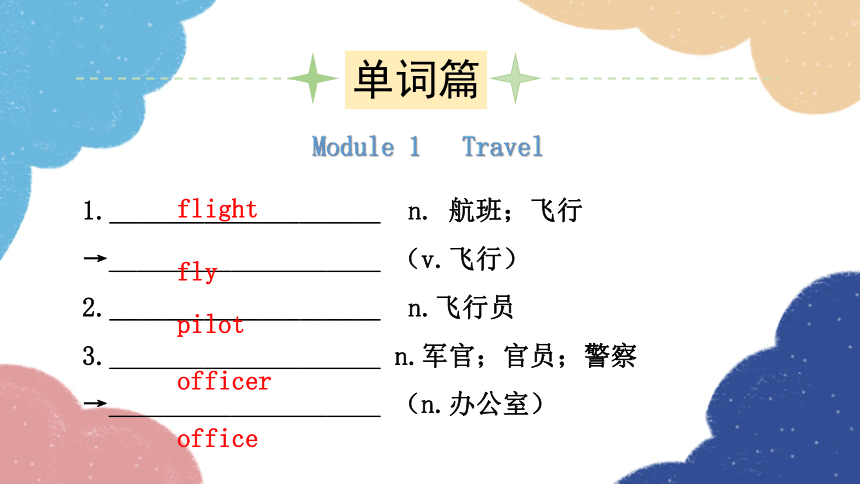
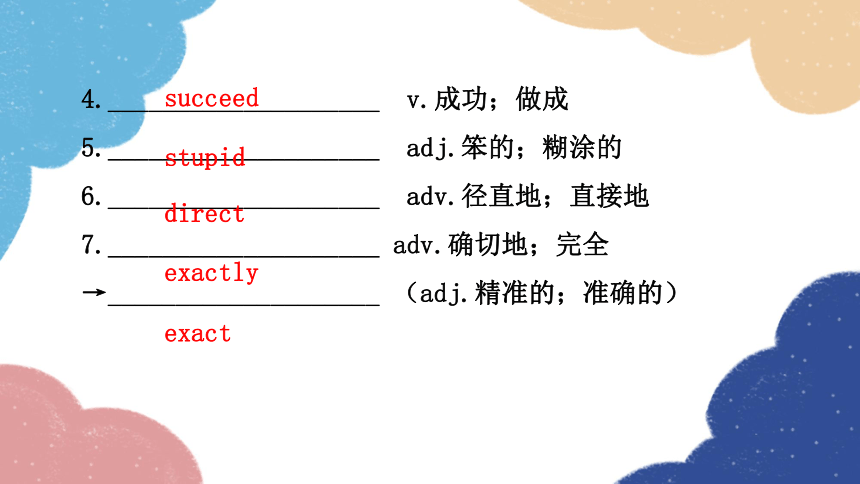
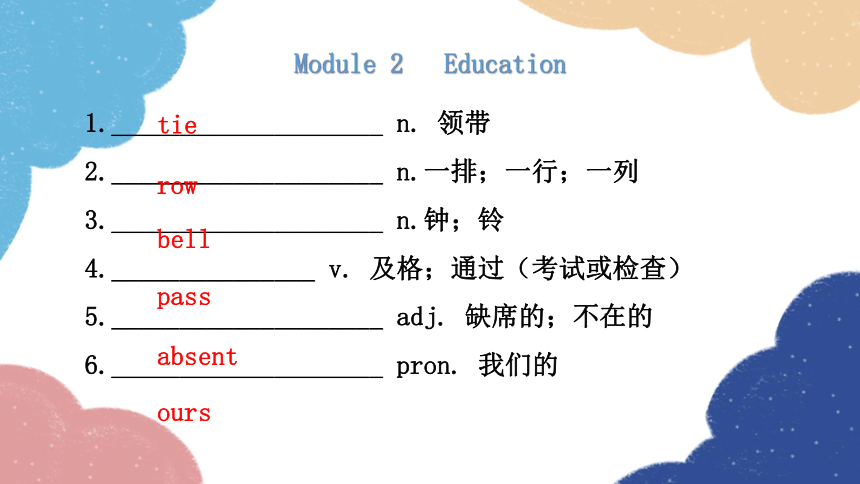
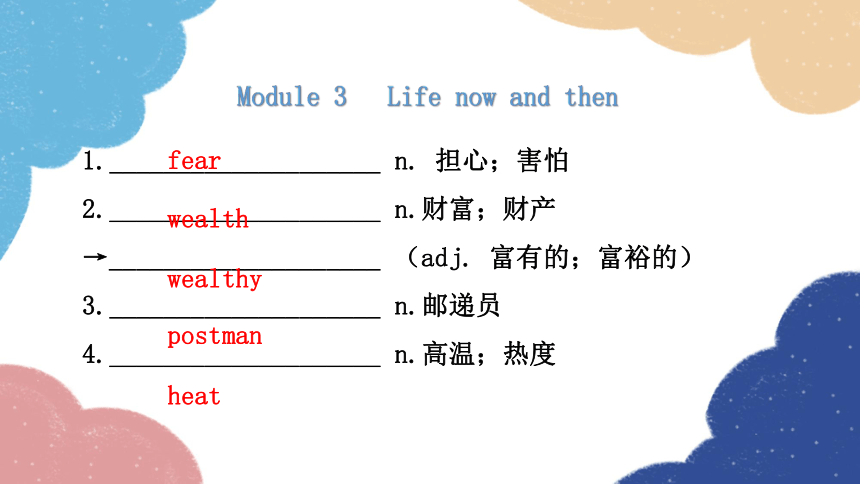
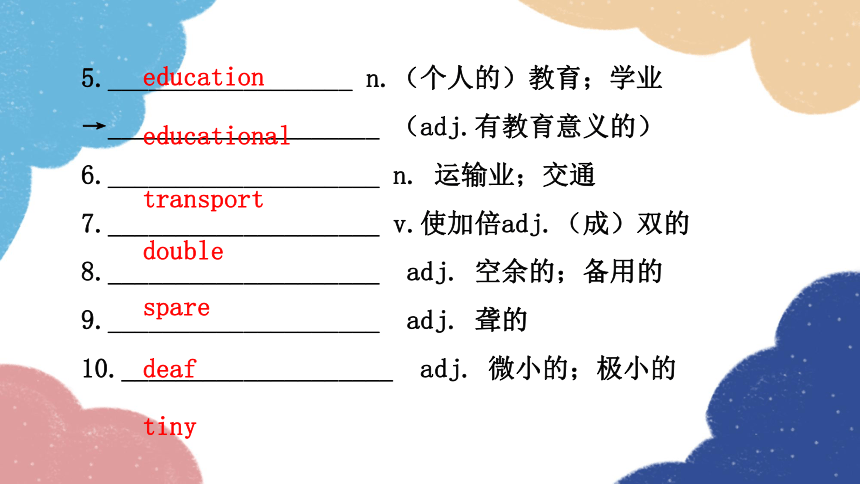
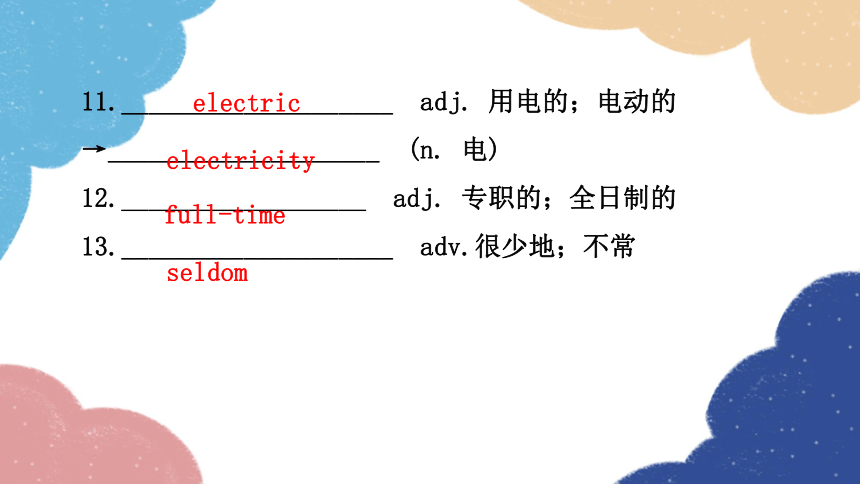

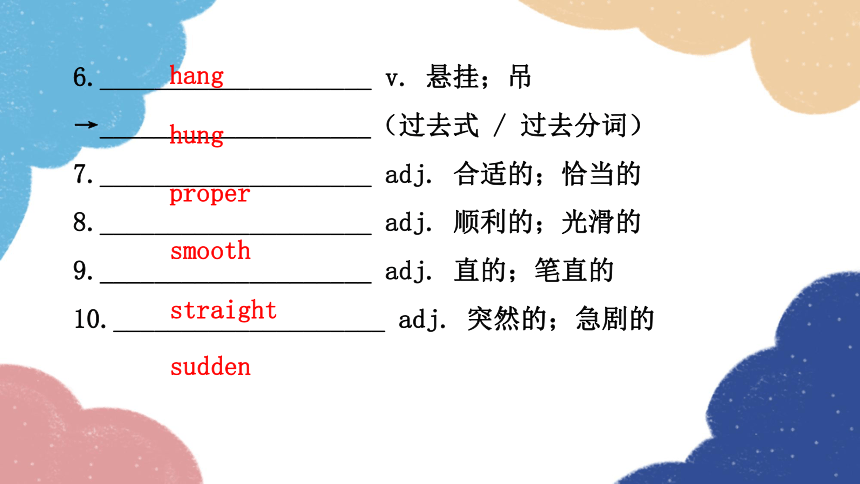
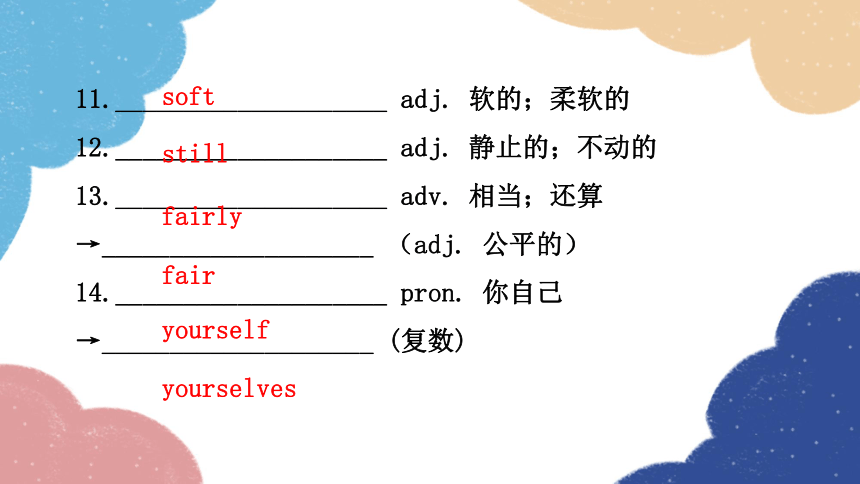

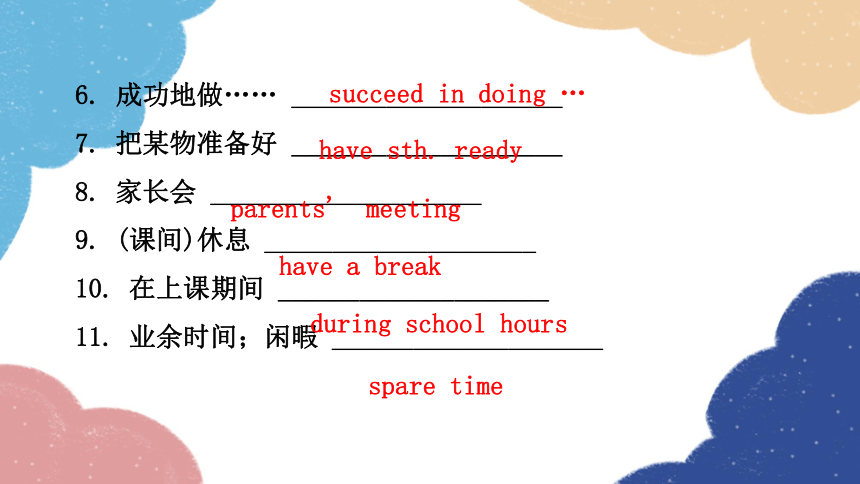
文档简介
(共76张PPT)
教材梳理(WY)
第十九节 九年级下册 Module 1 ~ Module 4
Module 1 Travel
单词篇
1.____________________ n. 航班;飞行
→____________________ (v.飞行)
2.____________________ n.飞行员
3.____________________ n.军官;官员;警察
→____________________ (n.办公室)
flight
fly
pilot
officer
office
4.____________________ v.成功;做成
5.____________________ adj.笨的;糊涂的
6.____________________ adv.径直地;直接地
7.____________________ adv.确切地;完全
→____________________ (adj.精准的;准确的)
succeed
stupid
direct
exactly
exact
Module 2 Education
1.____________________ n. 领带
2.____________________ n.一排;一行;一列
3.____________________ n.钟;铃
4._______________ v. 及格;通过(考试或检查)
5.____________________ adj. 缺席的;不在的
6.____________________ pron. 我们的
tie
row
bell
pass
absent
ours
Module 3 Life now and then
1.____________________ n. 担心;害怕
2.____________________ n.财富;财产
→____________________ (adj. 富有的;富裕的)
3.____________________ n.邮递员
4.____________________ n.高温;热度
fear
wealth
wealthy
postman
heat
5.__________________ n.(个人的)教育;学业
→____________________ (adj.有教育意义的)
6.____________________ n. 运输业;交通
7.____________________ v.使加倍adj.(成)双的
8.____________________ adj. 空余的;备用的
9.____________________ adj. 聋的
10.____________________ adj. 微小的;极小的
education
educational
transport
double
spare
deaf
tiny
11.____________________ adj. 用电的;电动的
→____________________ (n. 电)
12.__________________ adj. 专职的;全日制的
13.____________________ adv.很少地;不常
electric
electricity
full-time
seldom
Module 4 Rules and suggestions
1.____________________ n. 岩;岩石
2.____________________ n. 石头
3.____________________ n. 帐篷
4.____________________ n. 血液
5.____________________ v. 挨饿;饿死
rock
stone
tent
blood
starve
6.____________________ v. 悬挂;吊
→____________________(过去式 / 过去分词)
7.____________________ adj. 合适的;恰当的
8.____________________ adj. 顺利的;光滑的
9.____________________ adj. 直的;笔直的
10.____________________ adj. 突然的;急剧的
hang
hung
proper
smooth
straight
sudden
11.____________________ adj. 软的;柔软的
12.____________________ adj. 静止的;不动的
13.____________________ adv. 相当;还算
→____________________ (adj. 公平的)
14.____________________ pron. 你自己
→____________________ (复数)
soft
still
fairly
fair
yourself
yourselves
短语篇
1. 因为;由于 ____________________
2. 只要 ____________________
3. (告别用语)多保重 ____________________
4. 脱去 ____________________
5. 坐错座位 ____________________
because of
as long as
take care
take off
take the wrong seat
6. 成功地做…… ____________________
7. 把某物准备好 ____________________
8. 家长会 ____________________
9. (课间)休息 ____________________
10. 在上课期间 ____________________
11. 业余时间;闲暇 ____________________
succeed in doing …
have sth. ready
parents' meeting
have a break
during school hours
spare time
12. 大点声说 ____________________
13. 过去 ____________________
14. 终生;某人的一生 ____________________
15. 在夏日高温下 ____________________
16. 忙于做某事 ____________________
17. 动身;出发 ____________________
18. 入睡;睡着 ____________________
speak up
used to
all one' s life
in the summer heat
be busy doing sth.
set off
fall asleep
19. 攀岩 ____________________
20. 离开 ____________________
21. 一口气;一下子 ____________________
22. 独自地 ____________________
rock climbing
go off
in one go
on one' s own
课文篇
句式复习
1. 飞行员成功地按时着陆了。
______________________________________________
2. 只要你努力,没什么好担心的。
____________________________________________________________________________________________
The pilot succeeded in landing on time.
There' s nothing to worry about as long as you work hard.
3. 上课前,我们的老师检查学生的出勤情况。
______________________________________________________________________________________
4. 我们的学校也很好,而且我们这里有更多的学生。这意味着有更多人一起玩。
_________________________________________________________________________________________________________________________________
Before class,our teacher checks which pupils are present or absent.
Our school is great too,and we have more students here. This means more people to play with.
5. 当汽车的数量翻倍时,污染也加倍,甚至更糟糕。
____________________________________________________________________________________________
6. 总的说来,我认为今天的生活更好了。
______________________________________________
When the number of cars is doubled,the pollution is also doubled,or even worse.
Generally speaking,I think life is better today.
7. 你们一定要小心落石。
___________________________________________
8. 刚开始时应该是一段相当平坦的路。
___________________________________________
You must be careful of falling stones.
It should be a fairly smooth walk to begin with.
9. 如果它们知道我们在哪里, 它们可能不会靠得更近。
___________________________________________
___________________________________________
If they know where we are,they may not come any closer.
语篇再现
Passage 1
【九年级下册 Module 3】
How has life changed
Families have got smaller than they were in the past. Today most people only have one 1.__________.
child
The role of women has changed too. My daughter is really lucky. She has a good education, and she goes to work even after getting 2.__________. I' m happy to see she' s busy working every day, but sometimes I feel 3.__________ because she can' t come to see me often.
married
lonely
Transport and travel are easier today. When I was young, I went everywhere on foot or sometimes by bike. Now you can take the bus 4.__________, and there' s also the underground. And you young people can 5.__________ a plane to anywhere in the world. The only thing I don' t like, though, is that there' s so much more traffic. It' s so difficult to 6.__________ the road.
everywhere
take
cross
Of course, we didn' t have television when I was a child. I really enjoy watching television today. There' re so many good programmes, like the Beijing Opera and old films. But some of the shows are too noisy for me.
Generally 7.__________, I think life is better today. We eat better and we live longer.
speaking
Passage 2
【九年级下册 Module 4】
Suddenly, I saw a baby bear playing with some sticks and stones. He looked so soft and friendly, and I remember thinking, “If I 1.__________ out, I can just touch him.”
There was a loud 2.__________ behind me.
reach
noise
I stood very 3.__________. I didn' t even turn my head. There was another loud noise. The baby bear looked up, and ran towards me. I turned pale and he ran 4.__________ me into the woods.
I was still for a few minutes. Then slowly I turned round, and I saw the baby bear and his huge mother walking away.
still
past
I ran back to my friends. I have 5.__________ run so fast.
For the next ten days, every time there was a sudden noise, my 6.__________ went cold.
never
blood
考点篇
( )1. I am looking forward to the summer holiday. We' re going to take ___________ trip to ___________ Paris.
A. a; / B. an; / C. a; the
考点1
名词、冠词、数词【九年级下册 Module 1】
专练
A
( )2.—What would you like to eat
—___________, please.
A.Two bowls of noodle B.Two bowl of noodles
C.Two bowls of rice
( )3.—It' s really hot today.What drinks do we have in the fridge
—We have some ___________.
A.lemonade B.cheese C.hamburgers
C
A
点拨
详解见主书第一部分[第一节 名词]、[第七节 冠词]及[第五节 数词]。
考点2
in the end, at the end of和by the end of的区别【九年级下册 Module 1】
1. 最后,他完成了工作。
____________________, he finished the work.
2. 路的尽头有一家邮局。
There is a post office ____________________ the road.
专练
根据汉语意思完成句子,词数不限
In the end
at the end of
3. 到那天结束时,我已经写了五千多字。
____________________ the day, I had written five thousand more words.
By the end of
点拨
比较项 含义及用法
in the end 意为“最后;终于”,相当于at last, finally
at the end of 意为“在……的末端;在……的尽头”(可指时间或空间)
by the end of 意为“到……结束时;到……时为止”(常用于完成时)
考点3
代词、介词与介词短语【九年级下册Module 2】
( )1.Kids, don' t lose ___________ in playing computer games. It is bad for your eyes.
A.yourselves B.yourself C.themselves
专练
A
( )2.Kate arrived ___________ the village ___________ a snowy night.
A.at; on B.at; in C.in; on
( )3.—Why are you standing, Megan
—I can' t see the blackboard clearly. Three tall boys are sitting ___________ me.
A.behind B.in front of C.between
A
B
点拨
详解见主书第一部分[第四节 代词]及[第六节 介词]。
考点4
above all, after all, in all和at all的区别【九年级下册Module 2】
after all, in all, at all, above all
专练
根据句意,从方框中选择恰当的短语填空
1.____________________, don' t waste water and electricity.
2. How much is it ____________________
Above all
in all
3. Stop treating him like that. He is a child ____________________.
4. I meant nothing by it ____________________.
after all
at all
点拨
above all意为“最重要的是”;after all意为“毕竟;终究”;in all意为“总共;总计”;at all意为“一点也;完全(用于否定句中)”。
考点5
形容词与副词【九年级下册 Module 3】
My grandpa is an outgoing person. ____1____, he became ill years ago. He has greatly changed since then.
To help my grandpa overcome this ____2____ time, I decided to teach him to play the guitar and sing in the garden.
专练
Unluckily
difficult
The small garden was our classroom. We both enjoyed the special time that we spent together. We sat in two old bamboo chairs. The sunlight spread everywhere, shining brightly. Grandpa listened to my melody(旋律) ____3____ and clapped his hands to the beat. He started to gently sing an old song.
carefully
It was ____4____ melody in the world. It seemed that Grandpa was getting better at that moment.
( )1. A. Lucky B. Luckily C. Unluckily
( )2. A. difficult B. difficultly C. difficulty
( )3. A. care B. careful C. carefully
( )4. A. beautiful B. more beautiful
C. the most beautiful
C
A
C
C
the most beautiful
点拨
详解见主书第一部分[第三节 形容词和副词]。
1.这个高个子男人以前是一名老师,现在是一名歌手。
The tall man ______________ a teacher, but now he is a singer.
2.我父母习惯晚饭后散步。
My parents ____________________ a walk after dinner.
考点6
含有use的短语的区别【九年级下册 Module 3】
专练
根据汉语意思完成句子,词数不限
used to be
are / get used to taking
3.现在我们大多不用相机拍照了。
Most of us don' t __________________________ now.
4.刀被用来切东西。
Knives ___________________________________ things.
use the camera to take photos
are used to cut / are used for cutting
点拨
比较项 含义及用法
used to 意为“过去”,后跟动词原形,用于描述过去经常做的事情
be used to 意为“习惯”,后跟名词、代词或动名词,同get / become used to
意为“被用于”,是被动结构,to后跟动词原形,be used to do sth.与be used for doing sth.同义
use … to … 意为“用……来……”,to后跟动词原形
( )1.The number of the rest apples ___________ more than 10 in the fridge now.
A.are B.is C.was
考点7
the number of和a number of的区别【九年级下册 Module 3】
专练
B
( )2.A number of students ___________ having a good time yesterday evening.
A.are B.wa C.were
C
点拨
比较项 含义及用法
the number of 意为“……的数量”,作主语时谓语动词用单数形式
a number of 意为“许多”,修饰可数名词复数,作主语时谓语动词用复数形式
These days, something unusual is happening in our town. My best friend Sophia is really nervous. When she was interviewed by the local newspaper, she said,“Every night we hear strange noises outside our window. My husband thinks that it ____1____ be a cat, but I think it must be some people having fun.
考点8
情态动词【九年级下册 Module 4】
专练
could
We called the police, but they ____2____ find anything strange. They think it ____3____ be the wind. I don' t think so. My neighbour Cathy is worried too.”
Everyone in our town is feeling uneasy. There ____4____ be something visiting the homes in our neighbourhood. What is it on earth Who can help us
couldn' t
might
must
( )1. A. should B. could C. need
( )2. A. mustn' t B. won' t C. couldn' t
( )3. A. need B. might C. will
( )4. A. must B. can C. may
B
C
B
A
详解见主书第一部分[第二节 动词]。
点拨
( )1. She' s just ___________ to the Bahamas for a three-week holiday.
A. gone off B. turned off C. given off
( )2. I haven' t decided when to ___________ for London. I' m thinking it over.
A. put off B. fall off C. set off
考点9
与off相关的短语【九年级下册 Module 4】
专练
A
C
set off动身;出发
cut off剪断;切掉
take off脱掉;起飞
点拨
与off相关的短语:
go off离开;爆炸;变质
put off推迟;拖延
get off下车
turn off关闭
fall off 跌落;减少
give off发出;放出
演练篇
一、语法选择
Bangkok, the capital of Thailand, is a city full of beautiful sights. The tall glass shopping centres in the city look very modern. But behind them is a place where life ____1____ for over 100 years—the canals(运河), which were built in 1866. These canals are home to many Thai people ____2____ never leave there.
hasn' t changed
who
There are four markets on the canals around Bangkok, and the oldest and ____3____ one is in the town of Damonen Saduak. This market ____4____ at 6:30 am every day. People get there early ____5____ water taxi. It' s a noisy but wonderful place. Ladies sit in small boats ____6____ with fresh fruit and vegetables for sale. But they don' t just sell food. Would you like a silk tie?A traditional hat?Then just call ____7____ point at them.
most popular
opens
by
filled
and
After the excitement of shopping in ____8____ market, continue going along the canal. Soon you' ll see many wooden houses, colourful flowers and hear ____9____ birds singing in the fruit trees. It' s a peaceful way ____10____ your trip.
the
lovely
to finish
( )1.A. hasn' t changed B. didn' t change
C. won' t change
( )2.A. where B. which C. who
( )3.A. more popular B. most popular C. popular
( )4.A. opens B. will open C. opened
( )5.A. by B. on C. with
A
C
B
A
A
( )6.A. to fill B. filled C. filling
( )7.A. but B. so C. and
( )8.A. an B. the C. a
( )9.A. love B. lovely C. loving
( )10.A. to finish B. finishing C. finished
B
C
B
B
A
二、阅读理解(A篇)
Dear Erik,
Surprise! I believe you didn' t expect a note from your mum in your lunchbox! How is your school day so far I hope it' s going well. You always do your best. I am proud of you!
Because I had to leave so early this morning, I wrote this note last night and put it into your lunchbox to wish you well on your speech today. With all of your amazing research, writing, and practice, you are going to do great!
I know that you get little nervous talking in front of large groups—everybody does. But, just remember what you practised and you just might forget about being nervous.
Here are just a few things to remember when you are giving a speech:
1. Make eye contact(眼神交流)with your classmates.
2. Speak clearly and slowly.
3. Look at your note cards only when you have to.
4. Enjoy yourself! Once you are in front of the class, pretend(假装) that you are a famous expert on your topic and everyone is listening carefully to your EVERY word. (I do that sometimes!)
Well, that' s all for now. I am thinking of you today and I know you will do great. Do your best and be brave like George Washington. He was an excellent choice for your speech.
Good luck Erik!
Maybe we can go out for ice cream after school!
Love,
Mum
( )11.Where did Erik probably find this note
A. In his house. B. In his book.
C. In his wallet. D. In his lunchbox.
D
( )12.2022新考法:图片理解题What was Erik mainly going to do in school that day
A
( )13.How might Erik feel when talking in front of many people
A. Proud. B. Nervous.
C. Excited. D. Afraid.
B
( )14.What did Erik' s mother advise him to do to enjoy himself
A.Read his note cards.
B. Look at his classmates.
C.Talk like a famous expert.
D. Practise with his friends.
C
( )15.We can infer(推断) that Erik' s mother was full of __________ from this note.
A. love B. fear
C. thanks D. surprise
A
三、回答问题
Lu Lin, 16, a boy from Nujiang, Yunnan Province, has moved into a new apartment with his family. Seeing the great changes of his home town, he can' t help recalling the past life.
Several years ago, Lu Lin' s family had to live a very hard life.There was no electricity so he couldn' t watch TV and he knew little about the outside world. Because of the traffic blocking, his parents had to walk very far to buy necessities(必需品) of life. They also carried water from a faraway stream. His parents couldn' t afford Lu Lin' s schooling. He even didn' t have enough food to eat and often felt hungry. The five members in his family had to live in a run-down(破败的)room.
Nowadays, Lu Lin has a much better life. He can happily take the bus to school with his companions. He can know more about the outside world by watching TV. The wide roads have led to his house. He doesn' t need to worry about being hungry any more.
Thanks to the policy of“targeted poverty alleviation (精准扶贫)”, more than 800 million people under the International Poverty Line in China have been lifted out of poverty, reducing more than 70 percent of the global poverty population. “Shaking off poverty is not the end, but the new starting point for a new life and a new struggle,” President Xi said. “The people all over the country should work hard to push for higher-level development.”
16. Where does Lu Lin come from
______________________________________________________________________________________
17. Why couldn' t Lu Lin watch TV several years ago
___________________________________________
Lu Lin / He comes from Nujiang, Yunnan Province. / Nujiang, Yunnan Province.
Because there was no electricity several years ago.
18. How can Lu Lin know more about the outside world now
______________________________________________________________________________________
19. How many people have been lifted out of poverty in China so far
______________________________________________________________________________________
___________________________________________
Lu Lin / He can know more about the outside world by watching TV now. / By watching TV.
More than 800 million people have been lifted out of poverty in China so far. / More than 800 million people.
20. What should we do in the future according to President Xi
______________________________________________________________________________________
We should work hard to push for higher-level development according to President Xi.
THANKS!
教材梳理(WY)
第十九节 九年级下册 Module 1 ~ Module 4
Module 1 Travel
单词篇
1.____________________ n. 航班;飞行
→____________________ (v.飞行)
2.____________________ n.飞行员
3.____________________ n.军官;官员;警察
→____________________ (n.办公室)
flight
fly
pilot
officer
office
4.____________________ v.成功;做成
5.____________________ adj.笨的;糊涂的
6.____________________ adv.径直地;直接地
7.____________________ adv.确切地;完全
→____________________ (adj.精准的;准确的)
succeed
stupid
direct
exactly
exact
Module 2 Education
1.____________________ n. 领带
2.____________________ n.一排;一行;一列
3.____________________ n.钟;铃
4._______________ v. 及格;通过(考试或检查)
5.____________________ adj. 缺席的;不在的
6.____________________ pron. 我们的
tie
row
bell
pass
absent
ours
Module 3 Life now and then
1.____________________ n. 担心;害怕
2.____________________ n.财富;财产
→____________________ (adj. 富有的;富裕的)
3.____________________ n.邮递员
4.____________________ n.高温;热度
fear
wealth
wealthy
postman
heat
5.__________________ n.(个人的)教育;学业
→____________________ (adj.有教育意义的)
6.____________________ n. 运输业;交通
7.____________________ v.使加倍adj.(成)双的
8.____________________ adj. 空余的;备用的
9.____________________ adj. 聋的
10.____________________ adj. 微小的;极小的
education
educational
transport
double
spare
deaf
tiny
11.____________________ adj. 用电的;电动的
→____________________ (n. 电)
12.__________________ adj. 专职的;全日制的
13.____________________ adv.很少地;不常
electric
electricity
full-time
seldom
Module 4 Rules and suggestions
1.____________________ n. 岩;岩石
2.____________________ n. 石头
3.____________________ n. 帐篷
4.____________________ n. 血液
5.____________________ v. 挨饿;饿死
rock
stone
tent
blood
starve
6.____________________ v. 悬挂;吊
→____________________(过去式 / 过去分词)
7.____________________ adj. 合适的;恰当的
8.____________________ adj. 顺利的;光滑的
9.____________________ adj. 直的;笔直的
10.____________________ adj. 突然的;急剧的
hang
hung
proper
smooth
straight
sudden
11.____________________ adj. 软的;柔软的
12.____________________ adj. 静止的;不动的
13.____________________ adv. 相当;还算
→____________________ (adj. 公平的)
14.____________________ pron. 你自己
→____________________ (复数)
soft
still
fairly
fair
yourself
yourselves
短语篇
1. 因为;由于 ____________________
2. 只要 ____________________
3. (告别用语)多保重 ____________________
4. 脱去 ____________________
5. 坐错座位 ____________________
because of
as long as
take care
take off
take the wrong seat
6. 成功地做…… ____________________
7. 把某物准备好 ____________________
8. 家长会 ____________________
9. (课间)休息 ____________________
10. 在上课期间 ____________________
11. 业余时间;闲暇 ____________________
succeed in doing …
have sth. ready
parents' meeting
have a break
during school hours
spare time
12. 大点声说 ____________________
13. 过去 ____________________
14. 终生;某人的一生 ____________________
15. 在夏日高温下 ____________________
16. 忙于做某事 ____________________
17. 动身;出发 ____________________
18. 入睡;睡着 ____________________
speak up
used to
all one' s life
in the summer heat
be busy doing sth.
set off
fall asleep
19. 攀岩 ____________________
20. 离开 ____________________
21. 一口气;一下子 ____________________
22. 独自地 ____________________
rock climbing
go off
in one go
on one' s own
课文篇
句式复习
1. 飞行员成功地按时着陆了。
______________________________________________
2. 只要你努力,没什么好担心的。
____________________________________________________________________________________________
The pilot succeeded in landing on time.
There' s nothing to worry about as long as you work hard.
3. 上课前,我们的老师检查学生的出勤情况。
______________________________________________________________________________________
4. 我们的学校也很好,而且我们这里有更多的学生。这意味着有更多人一起玩。
_________________________________________________________________________________________________________________________________
Before class,our teacher checks which pupils are present or absent.
Our school is great too,and we have more students here. This means more people to play with.
5. 当汽车的数量翻倍时,污染也加倍,甚至更糟糕。
____________________________________________________________________________________________
6. 总的说来,我认为今天的生活更好了。
______________________________________________
When the number of cars is doubled,the pollution is also doubled,or even worse.
Generally speaking,I think life is better today.
7. 你们一定要小心落石。
___________________________________________
8. 刚开始时应该是一段相当平坦的路。
___________________________________________
You must be careful of falling stones.
It should be a fairly smooth walk to begin with.
9. 如果它们知道我们在哪里, 它们可能不会靠得更近。
___________________________________________
___________________________________________
If they know where we are,they may not come any closer.
语篇再现
Passage 1
【九年级下册 Module 3】
How has life changed
Families have got smaller than they were in the past. Today most people only have one 1.__________.
child
The role of women has changed too. My daughter is really lucky. She has a good education, and she goes to work even after getting 2.__________. I' m happy to see she' s busy working every day, but sometimes I feel 3.__________ because she can' t come to see me often.
married
lonely
Transport and travel are easier today. When I was young, I went everywhere on foot or sometimes by bike. Now you can take the bus 4.__________, and there' s also the underground. And you young people can 5.__________ a plane to anywhere in the world. The only thing I don' t like, though, is that there' s so much more traffic. It' s so difficult to 6.__________ the road.
everywhere
take
cross
Of course, we didn' t have television when I was a child. I really enjoy watching television today. There' re so many good programmes, like the Beijing Opera and old films. But some of the shows are too noisy for me.
Generally 7.__________, I think life is better today. We eat better and we live longer.
speaking
Passage 2
【九年级下册 Module 4】
Suddenly, I saw a baby bear playing with some sticks and stones. He looked so soft and friendly, and I remember thinking, “If I 1.__________ out, I can just touch him.”
There was a loud 2.__________ behind me.
reach
noise
I stood very 3.__________. I didn' t even turn my head. There was another loud noise. The baby bear looked up, and ran towards me. I turned pale and he ran 4.__________ me into the woods.
I was still for a few minutes. Then slowly I turned round, and I saw the baby bear and his huge mother walking away.
still
past
I ran back to my friends. I have 5.__________ run so fast.
For the next ten days, every time there was a sudden noise, my 6.__________ went cold.
never
blood
考点篇
( )1. I am looking forward to the summer holiday. We' re going to take ___________ trip to ___________ Paris.
A. a; / B. an; / C. a; the
考点1
名词、冠词、数词【九年级下册 Module 1】
专练
A
( )2.—What would you like to eat
—___________, please.
A.Two bowls of noodle B.Two bowl of noodles
C.Two bowls of rice
( )3.—It' s really hot today.What drinks do we have in the fridge
—We have some ___________.
A.lemonade B.cheese C.hamburgers
C
A
点拨
详解见主书第一部分[第一节 名词]、[第七节 冠词]及[第五节 数词]。
考点2
in the end, at the end of和by the end of的区别【九年级下册 Module 1】
1. 最后,他完成了工作。
____________________, he finished the work.
2. 路的尽头有一家邮局。
There is a post office ____________________ the road.
专练
根据汉语意思完成句子,词数不限
In the end
at the end of
3. 到那天结束时,我已经写了五千多字。
____________________ the day, I had written five thousand more words.
By the end of
点拨
比较项 含义及用法
in the end 意为“最后;终于”,相当于at last, finally
at the end of 意为“在……的末端;在……的尽头”(可指时间或空间)
by the end of 意为“到……结束时;到……时为止”(常用于完成时)
考点3
代词、介词与介词短语【九年级下册Module 2】
( )1.Kids, don' t lose ___________ in playing computer games. It is bad for your eyes.
A.yourselves B.yourself C.themselves
专练
A
( )2.Kate arrived ___________ the village ___________ a snowy night.
A.at; on B.at; in C.in; on
( )3.—Why are you standing, Megan
—I can' t see the blackboard clearly. Three tall boys are sitting ___________ me.
A.behind B.in front of C.between
A
B
点拨
详解见主书第一部分[第四节 代词]及[第六节 介词]。
考点4
above all, after all, in all和at all的区别【九年级下册Module 2】
after all, in all, at all, above all
专练
根据句意,从方框中选择恰当的短语填空
1.____________________, don' t waste water and electricity.
2. How much is it ____________________
Above all
in all
3. Stop treating him like that. He is a child ____________________.
4. I meant nothing by it ____________________.
after all
at all
点拨
above all意为“最重要的是”;after all意为“毕竟;终究”;in all意为“总共;总计”;at all意为“一点也;完全(用于否定句中)”。
考点5
形容词与副词【九年级下册 Module 3】
My grandpa is an outgoing person. ____1____, he became ill years ago. He has greatly changed since then.
To help my grandpa overcome this ____2____ time, I decided to teach him to play the guitar and sing in the garden.
专练
Unluckily
difficult
The small garden was our classroom. We both enjoyed the special time that we spent together. We sat in two old bamboo chairs. The sunlight spread everywhere, shining brightly. Grandpa listened to my melody(旋律) ____3____ and clapped his hands to the beat. He started to gently sing an old song.
carefully
It was ____4____ melody in the world. It seemed that Grandpa was getting better at that moment.
( )1. A. Lucky B. Luckily C. Unluckily
( )2. A. difficult B. difficultly C. difficulty
( )3. A. care B. careful C. carefully
( )4. A. beautiful B. more beautiful
C. the most beautiful
C
A
C
C
the most beautiful
点拨
详解见主书第一部分[第三节 形容词和副词]。
1.这个高个子男人以前是一名老师,现在是一名歌手。
The tall man ______________ a teacher, but now he is a singer.
2.我父母习惯晚饭后散步。
My parents ____________________ a walk after dinner.
考点6
含有use的短语的区别【九年级下册 Module 3】
专练
根据汉语意思完成句子,词数不限
used to be
are / get used to taking
3.现在我们大多不用相机拍照了。
Most of us don' t __________________________ now.
4.刀被用来切东西。
Knives ___________________________________ things.
use the camera to take photos
are used to cut / are used for cutting
点拨
比较项 含义及用法
used to 意为“过去”,后跟动词原形,用于描述过去经常做的事情
be used to 意为“习惯”,后跟名词、代词或动名词,同get / become used to
意为“被用于”,是被动结构,to后跟动词原形,be used to do sth.与be used for doing sth.同义
use … to … 意为“用……来……”,to后跟动词原形
( )1.The number of the rest apples ___________ more than 10 in the fridge now.
A.are B.is C.was
考点7
the number of和a number of的区别【九年级下册 Module 3】
专练
B
( )2.A number of students ___________ having a good time yesterday evening.
A.are B.wa C.were
C
点拨
比较项 含义及用法
the number of 意为“……的数量”,作主语时谓语动词用单数形式
a number of 意为“许多”,修饰可数名词复数,作主语时谓语动词用复数形式
These days, something unusual is happening in our town. My best friend Sophia is really nervous. When she was interviewed by the local newspaper, she said,“Every night we hear strange noises outside our window. My husband thinks that it ____1____ be a cat, but I think it must be some people having fun.
考点8
情态动词【九年级下册 Module 4】
专练
could
We called the police, but they ____2____ find anything strange. They think it ____3____ be the wind. I don' t think so. My neighbour Cathy is worried too.”
Everyone in our town is feeling uneasy. There ____4____ be something visiting the homes in our neighbourhood. What is it on earth Who can help us
couldn' t
might
must
( )1. A. should B. could C. need
( )2. A. mustn' t B. won' t C. couldn' t
( )3. A. need B. might C. will
( )4. A. must B. can C. may
B
C
B
A
详解见主书第一部分[第二节 动词]。
点拨
( )1. She' s just ___________ to the Bahamas for a three-week holiday.
A. gone off B. turned off C. given off
( )2. I haven' t decided when to ___________ for London. I' m thinking it over.
A. put off B. fall off C. set off
考点9
与off相关的短语【九年级下册 Module 4】
专练
A
C
set off动身;出发
cut off剪断;切掉
take off脱掉;起飞
点拨
与off相关的短语:
go off离开;爆炸;变质
put off推迟;拖延
get off下车
turn off关闭
fall off 跌落;减少
give off发出;放出
演练篇
一、语法选择
Bangkok, the capital of Thailand, is a city full of beautiful sights. The tall glass shopping centres in the city look very modern. But behind them is a place where life ____1____ for over 100 years—the canals(运河), which were built in 1866. These canals are home to many Thai people ____2____ never leave there.
hasn' t changed
who
There are four markets on the canals around Bangkok, and the oldest and ____3____ one is in the town of Damonen Saduak. This market ____4____ at 6:30 am every day. People get there early ____5____ water taxi. It' s a noisy but wonderful place. Ladies sit in small boats ____6____ with fresh fruit and vegetables for sale. But they don' t just sell food. Would you like a silk tie?A traditional hat?Then just call ____7____ point at them.
most popular
opens
by
filled
and
After the excitement of shopping in ____8____ market, continue going along the canal. Soon you' ll see many wooden houses, colourful flowers and hear ____9____ birds singing in the fruit trees. It' s a peaceful way ____10____ your trip.
the
lovely
to finish
( )1.A. hasn' t changed B. didn' t change
C. won' t change
( )2.A. where B. which C. who
( )3.A. more popular B. most popular C. popular
( )4.A. opens B. will open C. opened
( )5.A. by B. on C. with
A
C
B
A
A
( )6.A. to fill B. filled C. filling
( )7.A. but B. so C. and
( )8.A. an B. the C. a
( )9.A. love B. lovely C. loving
( )10.A. to finish B. finishing C. finished
B
C
B
B
A
二、阅读理解(A篇)
Dear Erik,
Surprise! I believe you didn' t expect a note from your mum in your lunchbox! How is your school day so far I hope it' s going well. You always do your best. I am proud of you!
Because I had to leave so early this morning, I wrote this note last night and put it into your lunchbox to wish you well on your speech today. With all of your amazing research, writing, and practice, you are going to do great!
I know that you get little nervous talking in front of large groups—everybody does. But, just remember what you practised and you just might forget about being nervous.
Here are just a few things to remember when you are giving a speech:
1. Make eye contact(眼神交流)with your classmates.
2. Speak clearly and slowly.
3. Look at your note cards only when you have to.
4. Enjoy yourself! Once you are in front of the class, pretend(假装) that you are a famous expert on your topic and everyone is listening carefully to your EVERY word. (I do that sometimes!)
Well, that' s all for now. I am thinking of you today and I know you will do great. Do your best and be brave like George Washington. He was an excellent choice for your speech.
Good luck Erik!
Maybe we can go out for ice cream after school!
Love,
Mum
( )11.Where did Erik probably find this note
A. In his house. B. In his book.
C. In his wallet. D. In his lunchbox.
D
( )12.2022新考法:图片理解题What was Erik mainly going to do in school that day
A
( )13.How might Erik feel when talking in front of many people
A. Proud. B. Nervous.
C. Excited. D. Afraid.
B
( )14.What did Erik' s mother advise him to do to enjoy himself
A.Read his note cards.
B. Look at his classmates.
C.Talk like a famous expert.
D. Practise with his friends.
C
( )15.We can infer(推断) that Erik' s mother was full of __________ from this note.
A. love B. fear
C. thanks D. surprise
A
三、回答问题
Lu Lin, 16, a boy from Nujiang, Yunnan Province, has moved into a new apartment with his family. Seeing the great changes of his home town, he can' t help recalling the past life.
Several years ago, Lu Lin' s family had to live a very hard life.There was no electricity so he couldn' t watch TV and he knew little about the outside world. Because of the traffic blocking, his parents had to walk very far to buy necessities(必需品) of life. They also carried water from a faraway stream. His parents couldn' t afford Lu Lin' s schooling. He even didn' t have enough food to eat and often felt hungry. The five members in his family had to live in a run-down(破败的)room.
Nowadays, Lu Lin has a much better life. He can happily take the bus to school with his companions. He can know more about the outside world by watching TV. The wide roads have led to his house. He doesn' t need to worry about being hungry any more.
Thanks to the policy of“targeted poverty alleviation (精准扶贫)”, more than 800 million people under the International Poverty Line in China have been lifted out of poverty, reducing more than 70 percent of the global poverty population. “Shaking off poverty is not the end, but the new starting point for a new life and a new struggle,” President Xi said. “The people all over the country should work hard to push for higher-level development.”
16. Where does Lu Lin come from
______________________________________________________________________________________
17. Why couldn' t Lu Lin watch TV several years ago
___________________________________________
Lu Lin / He comes from Nujiang, Yunnan Province. / Nujiang, Yunnan Province.
Because there was no electricity several years ago.
18. How can Lu Lin know more about the outside world now
______________________________________________________________________________________
19. How many people have been lifted out of poverty in China so far
______________________________________________________________________________________
___________________________________________
Lu Lin / He can know more about the outside world by watching TV now. / By watching TV.
More than 800 million people have been lifted out of poverty in China so far. / More than 800 million people.
20. What should we do in the future according to President Xi
______________________________________________________________________________________
We should work hard to push for higher-level development according to President Xi.
THANKS!
